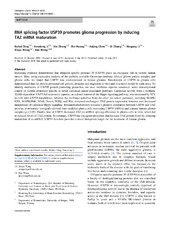| dc.contributor.author | Ding, Kaikai | en_US |
| dc.contributor.author | Ji, Jianxiong | en_US |
| dc.contributor.author | Zhang, Xin | en_US |
| dc.contributor.author | Huang, Bin | en_US |
| dc.contributor.author | Chen, Anjing | en_US |
| dc.contributor.author | Zhang, Di | en_US |
| dc.contributor.author | Li, Xingang | en_US |
| dc.contributor.author | Wang, Xinyu | en_US |
| dc.contributor.author | Wang, Jian | en_US |
| dc.date.accessioned | 2020-08-05T09:28:54Z | |
| dc.date.available | 2020-08-05T09:28:54Z | |
| dc.date.issued | 2019 | |
| dc.Published | Ding K, Ji J, Zhang X, Huang B, Chen A, Zhang D, Li X, Wang X, Wang J. RNA splicing factor USP39 promotes glioma progression by inducing TAZ mRNA maturation. Oncogene. 2019;38:6414–6428 | eng |
| dc.identifier.issn | 0950-9232 | |
| dc.identifier.issn | 1476-5594 | |
| dc.identifier.uri | https://hdl.handle.net/1956/23438 | |
| dc.description.abstract | Increasing evidence demonstrates that ubiquitin specific protease 39 (USP39) plays an oncogenic role in various human tumors. Here, using expression analysis of the publicly available Oncomine database, clinical glioma patient samples, and glioma cells, we found that USP39 was overexpressed in human gliomas. Knockdown of USP39 in glioma cells demonstrated that the protein promoted cell growth, invasion and migration in vitro and in a tumor model in nude mice. To identify mediators of USP39 growth-promoting properties, we used luciferase reporter constructs under transcriptional control of various promoters specific to seven canonical cancer-associated pathways. Luciferase activity from a synthetic TEAD-dependent YAP/TAZ-responsive reporter, as a direct readout of the Hippo signaling pathway, was decreased by 92% in cells with USP39 knockdown, whereas the luciferase activities from the other six cancer pathways, including MAPK/ERK, MAPK/JNK, NFκB, Notch, TGFβ, and Wnt, remained unchanged. TAZ protein expression however was decreased independent of canonical Hippo signaling. Immunohistochemistry revealed a positive correlation between USP39 and TAZ proteins in orthotopic xenografts derived from modified glioma cells expressing USP39 shRNAs and primary human glioma samples (p < 0.05). Finally, loss of USP39 decreased TAZ pre-mRNA splicing efficiency in glioma cells in vitro, which led to reduced levels of TAZ protein. In summary, USP39 has oncogenic properties that increase TAZ protein levels by inducing maturation of its mRNA. USP39 therefore provides a novel therapeutic target for the treatment of human glioma. | en_US |
| dc.language.iso | eng | eng |
| dc.publisher | Springer Nature | eng |
| dc.rights | Attribution CC BY | eng |
| dc.rights.uri | http://creativecommons.org/licenses/by/4.0 | eng |
| dc.title | RNA splicing factor USP39 promotes glioma progression by inducing TAZ mRNA maturation | en_US |
| dc.type | Peer reviewed | |
| dc.type | Journal article | |
| dc.date.updated | 2020-01-17T09:48:44Z | |
| dc.description.version | publishedVersion | en_US |
| dc.rights.holder | Copyright 2019 The Author(s) | |
| dc.identifier.doi | https://doi.org/10.1038/s41388-019-0888-1 | |
| dc.identifier.cristin | 1738699 | |
| dc.source.journal | Oncogene | |

